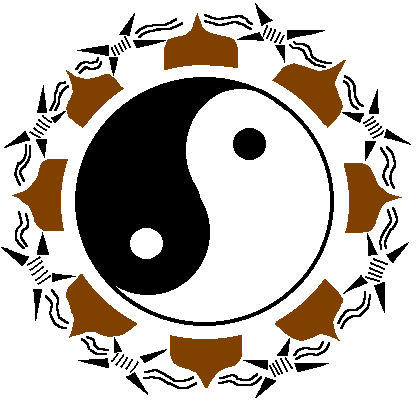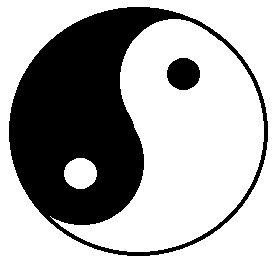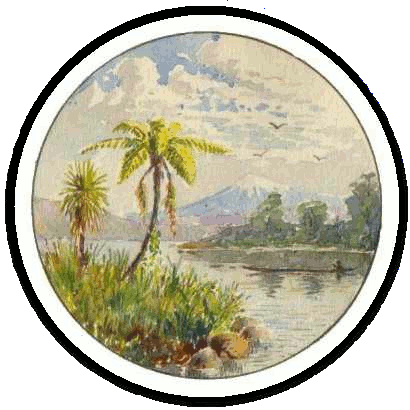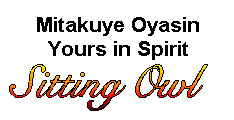Taoism
&
Peace of Mind
Excerpt From
 ‘The Tao of Physics’
‘The Tao of Physics’
By: Fritjof Capra
Compiled 
Fritjof Capra speaks of the unity of the pairs of opposites within the infinite aspect of the universe, the uniting principal, which is the Creator, God etc. thus:
"Space and time themselves are two concepts which had seemed entirely different, but have been unified in relativistic physics. This fundamental unity is the basis of the unification of the opposite concepts mentioned above. Like the unity of opposites experienced by the mystics, it takes place on a ‘higher plane’, i.e. in a higher dimension, and like that experienced by the mystics it is a dynamic reality where objects are also processes and all forms are dynamic patterns…"
And he speaks of the dynamic nature of the infinite (God) within the finite (Man, or more accurately, us, All Our Relations) thus:
"The central aim of Eastern mysticism is to experience all phenomena in the world as manifestations of the same ultimate reality. This reality is seen as the essence of the universe, underlying and unifying the multitude of things and events we observe. The Hindus call it Brahman, the Buddhists Dharma-kaya (the Body of Being), or Tathata (Suchness), and the Taoists Tao; each affirming that it transcends our intellectual concepts and defies further description. This ultimate essence, however, cannot be separated from its multiple manifestations. It is central to its very nature to manifest itself in myriad forms, which come into being and disintegrate, transforming themselves into one another without end.
"In its phenomenal aspect, the cosmic One is thus intrinsically dynamic, and the apprehension of its dynamic nature is basic to all schools of Eastern mysticism. Thus D.T. Suzuki writes about the Kegon school of Mahayana Buddhism:
The central idea of Kegon is to grasp the universe dynamically whose characteristic is always to move onward, to be forever in the mood of moving, which is life."
Also, as Fritjof Capra’s main aim is to bring our awareness to the similarities of physics and Eastern mysticism, he speaks of the transcendent nature of God etc. Who, by the way, transcends (is beyond) any name such as God, and even transcends thought.
A further similarity between the ways of the physicist and mystic is the fact that their observations take place in realms which are inaccessible to the ordinary senses. In modern physics, these are the realms of the atomic and subatomic world; in mysticism they are non-ordinary states of consciousness in which the sense world is transcended. Mystics often talk about experiencing higher dimensions in which impressions of different centres of consciousness are integrated into a harmonious whole. A similar situation exists in modern physics where a four-dimensional ‘space-time’ formalism has been developed which unifies concepts and observations belonging to different categories in the ordinary three-dimensional world. In both fields, the multi-dimensional experiences transcend the sensory world and are therefore almost impossible to express in ordinary language."
 TAOISM
TAOISM 
Excerpt From
‘The Tao of Health and Longevity’
By: Da Liu (PP. 12 – 22)
Compiled 
The contribution of Taoist thought toward the understanding of longevity and how to attain good health comes about by direct application of its most central teachings. In fact, it is a major theme of the Tao Te Ching, the great classic by Lao Tzu.
Lao Tzu spent a good part of his early life as a civil servant, working as curator of the royal library of the state of Chou. In this capacity, it was his opportunity to study carefully the ancient writings, including many books and records that have since been lost or destroyed. After many years, he retired and went into seclusion in the Western mountains. It is not known when he died. According to one legend, he went to India and was involved in the origin of Buddhism. (Joseph Needham, Science and Civilization in China, Vol II, 1954, P. 159.) Another legend is that he became an immortal and still lives alone in the high mountains. In any case, before going away he left behind a small work that brought together all the knowledge he had acquired after years of study and expressed all the essential features of the philosophy of Taoism. This writing came to be known as the Tao Te Ching, perhaps the most beautiful book ever written.
Several chapters of the Tao Te Ching concern the attainment of longevity through the process of rejuvenation. The relevant passages are interesting for their conception of the aims as well as the methods of this process. The following is taken from Chapter 10:
"When the spirit and the body are truly integrated, they can be kept from separating. When one concentrates the attention on fastening the spirit to the body and at the same time on the breathing (vitality), thereby attaining the utmost flexibility, he can become like a newborn baby." ( For other translations, see Legge, TT, Vol I, P.53; and Ch’u To Kao, Tao Te Ching (1973) P.22.)
To appreciate the point of this passage, it is helpful to consider the following one from Chapter 55:
"He who attains true integration (the attributes of the Tao) is like a newborn baby. Poisonous insects will not sting him; birds of prey will not attack him. The baby’s bones seem weak and his sinews soft, yet his grasp is strong. He knows nothing about the union of male and female,* yet his penis may sometimes become erect, revealing the perfection of his vital essence. Although he may cry all day long, he never becomes hoarse, showing his attainment of perfect harmony. He who understands this harmony knows the secret of unchanging vitality. He who knows the unchanging is enlightened." (Other translations see Legge, TT Vol I P.99; Needham, P.140; and Ch’u To Kao, P. 70.)
*Ignorance of the union between male and female is the subject of a humorous story in a famous Chinese novel The Dream of the Red Chamber, written during the Ch’ing dynasty by Ts’ao Hsueh Ch’in. According to the story, a young maidservant (whose nickname, Sa Ta Chieh, means “Innocent Girl”) found an elegant ornamental purse embroidered with a pornographic picture. She was surprised about her find, and shouted it to her mistress, “Look! Fighting monsters!”
According to these quoted passages, the aim of the rejuvenation process is the achievement of perfect integration between the physical and spiritual aspects of human life. If one can attain this, his life will be free from harm. The goal of this attainment is spoken of as becoming like a newborn baby. The idea is that, when we are born, our bodies and minds are naturally harmonious, and we are completely flexible and open to whatever we may experience. As we grow up, however, we are subject to many pressures and worries and, in order to deal with them, we become unnaturally sophisticated and, as a result, lose our flexibility, becoming rigid and unyielding. This creates tension between our physical and spiritual aspects, and we gradually lose our original integration, deteriorate, and eventually die. The process of rejuvenation is a way of restoring harmony, and thus preventing deterioration. It works by concentrating the attention on the breathing, thus taking the mind away from the pressures and worries of life, and also by increasing mental and physical flexibility through the practice of gentle exercises.
Other passages in the Tao Te Ching emphasize the importance of keeping the mind peaceful and free from the pressures and distractions of social life in order to restore inner harmony. This is the point of the following excerpt from Chapter 20:
"Most people look satisfied and pleased, as if celebrating a festival or climbing the heights in springtime. I alone seem quiet and listless, without any apparent desires…. Most people seem to have plenty. I alone seem to lack…. Most people seem intelligent and wise. I alone seem stupid and dull. Most people appear useful. I alone seem worthless. I am different from other men, for only I value the Tao." (See Legge, TT, vol. I, pp. 62-63.)
In spite of what this passage may seem to imply out of context, it does not mean that one must become a total recluse, completely cut off from other people, in order to achieve rejuvenation. What it does say is that even though it may seem attractive to keep up with the pace of society, there is even greater, longer-lasting value in being different and concentrating on inner harmony. Many elderly people now suffer unhappiness because old age forces them to withdraw from activities they consider important and to spend a great deal of time alone. They should find great consolation by discovering for themselves Lao Tzu’s insight that to be left out of things is not necessarily a hardship, but in a very deep sense, a benefit.
Another point mentioned in the quotation above concerns freedom from desires. This is expanded upon in other passages as well, such as the following from Chapter 46:
"There is no mistake greater than that of being ambitious; there is no calamity greater than that of being discontented; there is no fault greater than the desire for riches. Therefore, true contentment is an enduring and unchanging happiness." (See ibid., p.89.)
Whoever is able to attain freedom from ambitions and desires can escape the tension that results from continually striving to satisfy them. He has no need to insist on his point of view. He is never disappointed. He is soft and yielding and easily accepts whatever situation may come to pass. The realization of this insight in one’s daily life is close to the secret of longevity, for, as Lao Tsu observes in Chapter 76:
"When a man is alive, his body is soft and flexible; when he is dead, it is hard and rigid. So it is with all things. Trees and plants are soft and pliant when they are growing; when they die they are dry and brittle. Thus, to be hard and rigid is the way of death; to be soft and yielding is the way of life." (Ibid., p. 118.)
After Lao Tzu, the most important figure in Taoist history is Chuang Tzu. His writings follow closely the ideas of Lao Tzu but are much more detailed, containing many stories and parables as well as accounts of conversations…. Concerns of health and longevity are a major topic in these writings, and relevant passages can be found in nearly every chapter….
Chuang Tzu himself was offered the position of prime minister in the state of Ch’u, but he refused to accept it…. Upon hearing the offer, he compared himself to a tortoise, saying that he would rather continue to drag his tail through the mud than die and have his shell kept in a place of honour in the king’s ancestral temple. The point is that high positions carry with them a great burden of problems and worries. Those who hold them inevitably suffer personal stress and lose the freedom to attain harmony with nature. Thus burdened, they are likely to die prematurely, unable to benefit from the honours that are bestowed on them posthumously….
Chuang Tzu’s indifference toward power and prestige is typical of his attitude toward the other values people commonly strive for. In Chapter 18 of his writings, entitled “Perfect Happiness.” The discussion concerns whether there really exists such a thing as perfect happiness. He observes that people generally assume that it involves the fulfilment of their desires and the avoidance of pain. Thus they urgently work toward such things as riches, skills, honours, longevity, security, an abundance of good food, fine clothing, beautiful things to look at, and pleasing music. Unfortunately, there seems to be inevitable disappointment in such striving. Even if some desires are fulfilled, others remain empty, and become a source of worry and confusion. Chuang Tzu expresses his own view as follows:
"Regarding what people commonly do today and what gives them joy, I am not sure whether that joy is really joy or not. I see them pursuing all their aims automatically, as if they had no other choice. But what they regard as joy would not be so to me, yet I do not claim that there is no joy in it. Is there such a thing as true joy or not? To me, doing nothing (perfect freedom) seems to be true joy, but people ordinarily consider it a waste. Thus it is said: “Perfect joy gives no thought to joy; the highest praise gives no thought to praise.” (ibid., vol. II, p. 3.)
From this passage we can see that Chuang Tzu, like Lao Tzu, refrains from pursuing all the commonly esteemed values and instead seeks freedom and peace of mind. Another important aspect of his philosophy is also revealed in the quotation, namely the idea that many things that seem inevitable or absolutely true about the world are actually relative to a temporary point of view and subject to change. As a result of this view, Chuang Tzu generally regards it as pointless to argue about questions of right and wrong or about what may be profitable or harmful, for the answers to such questions can only be given relative to changing situations and viewpoints. Thus the person with true wisdom is not concerned about such distinctions. He does not need to worry about unexpected changes and can accept whatever may occur without sadness or disappointment. Chuang Tzu tells several stories that illustrate the benefits of this philosophy…."
The phenomenon of dreaming was of great interest to Chuang Tzu, and not merely as a storytelling device. In a deeply reflective passage he finds in it a profound insight regarding the distinction between appearance and reality.
"Those who dream of drinking wine may weep the next morning. Those who dream of weeping may enjoy hunting the next morning. During their dreams they are not aware that they are dreaming, but only after waking up do they understand that they have been dreaming. Sometime there will be a great awakening, and we will then realise that this life is merely a big dream. Meanwhile, the stupid think they are already awake. Insisting on their limited knowledge, they think they can tell the difference between rulers and herdsmen. What prejudice! Confucius and you are both dreaming, and my telling you that you are dreaming is also merely a dream." (ibid., vol. I, pp194-195.)
The point here is that once we notice that a dream may be vivid enough that the dreamer does not realise that he is not awake, we must admit the possibility that our entire experience, including all we regard as true and real, is nothing but a figment of our dreaming imagination. There is nothing within our experience that can guarantee to us, as we experience it, that it is waking rather than dream experience. The consequences of this realisation cut deeply into the ordinary notion of reality, for it casts into doubt virtually all beliefs about the world….
Throughout his writings, Chuang Tzu again and again emphasises the importance of a peaceful attitude toward life….
"If one is interested in a good character without tormenting the mind, in self-improvement without propriety and self-righteousness, in successful government service without spectacular deeds and fame, in enjoyment of leisure without going to beach or river resorts, in longevity without breathing or stretching exercises, then one forgets all things, yet possesses all things. When one has become completely free, all fine things come one’s way. Such men pursue the way of nature, and display true wisdom. Thus it is said, “Placidity, indifference, silence, quietude, emptiness, and inaction: these are the attributes which constitute the stability of nature and the essence of the Tao.” (ibid., vol. I. Pp. 364-65.)
In order to understand this quotation correctly, we must be careful in interpreting it. At first glance, it seems to say that breathing and movement exercises such as those described in this book are unnecessary for good health, that it is sufficient to maintain a certain mental attitude toward life. In a way, this is true. However, the context of the quotation makes clear that such a conclusion applies literally only at the most advanced stage of the practice of Taoism, in which the exercises become an unnecessary hindrance. In the early stages, and certainly at the beginning, it is essential to have a proper balance that includes both the practice of regular exercises and the realisation of a peaceful, worry-free attitude through reflective insight. It is good to keep in mind the warning of Carl Jung, who after studying the Taoist classics carefully for many years, observed that they would be a “poison for the Western mind,” since the Western tendency merely to study words instead of actually experiencing their content would reduce the Taoist teachings to a dangerous ideology….
But one can avoid the dangers of an overly intellectual approach and realise the full benefit of Taoist wisdom by treating it neither as a pure ideology nor as a pure technique but as a properly balanced way of living one’s whole life. The concept of “balance” is thus crucial for the successful application of the various theoretical aspects.
Please turn over for another excerpt from this magnificent book. It is the entire last Chapter called ‘Peace of Mind’
 Peace of Mind
Peace of Mind 
Chapter 11 From:
‘The Tao of Health and Longevity’
By: Da Liu (PP. 176 – 178)
Compiled 
In Chapter 2, we saw how the ancient Taoist and Confucian classics emphasized the importance of a peaceful mind for health, longevity, and the attainment of true wisdom. Study of the ancient classics is itself a helpful aid for the attainment of peaceful mind, but it is much more important to put the practical advice they contain into effect in our daily lives. But how can this be done? It would seem that the fast pace and pressures of modern city life might make it difficult actually to live according to Taoist principles. But, though ancient China or rural Russia are places in which the peaceful attitude is more natural, this fact only serves to emphasize how much more the benefits of the Taoist attitude are needed in modern life, in which there are so many environmental dangers and threats to our health.
The most essential practical aspects of achieving peace of mind are quite simple. Don’t insist on your ideas about how the world should be. Avoid thinking of events as “good” or “bad.” Do not condemn or praise the fortunes or actions of others. Do not worry about your own personal loss or gain in dealing with others. Be happy with whatever comes to pass. If it appears that someone has done you harm, repay the injury with kindness. Do not be in a hurry to get anywhere or achieve anything. Don’t concentrate or think too much or put too much energy into achieving your goals. Rest a lot.
Once you begin following this advice regularly in your life, it comes to seem very easy, and any initial difficulties seem trivial. It is a great comfort to be able to accept daily experience not in spite of its evils through the expectation of a heaven after death, but joyfully welcoming whatever it may bring us through an attitude that transcends the limitations of the distinction between good and evil. In this way we become happy through our harmony with the universe as a whole, and realise our heaven in the present.
Perhaps the greatest single insight in all this is that nothing in the world is either good or bad, right or wrong. Affairs simply appear to have value because of the limitation of one’s point of view. Many Chinese stories and poems illustrate this insight in various ways. Among the most pleasing is to be found in the Huai Nan Tzu, by the Han dynasty writer Liu An.
According to the story, a farmer in Northern China, near the Mongolian border, discovered one day that his horse had disappeared. He knew not whether it had been lost or stolen and was put to great inconvenience, for he needed the horse for his work. His neighbours came to console him and grieved at the calamity that had befallen him. But the farmer would have none of it, pointing out that what had happened was not necessarily so bad, and so it did not warrant grief.
A few days later, the horse returned, accompanied by a magnificent Mongolian stallion that had strayed from its herd and followed along. This not only relieved the farmer’s inconvenience but also greatly increased his wealth, for the horse was truly a prize. His friendly neighbours came rejoicing in his good fortune and envied him for the fine animal he had gotten through a stroke of luck. But the farmer did not rejoice with them, pointing out that what had happened was not necessarily so good.
Not long after that, the farmer’s son was riding the Mongolian horse and found himself unable to control it, for his experience as a horseman was limited to riding the more docile plough horse. The frisky stallion threw him off, and his thigh was badly injured, leaving him lame. Although the farmer was again inconvenienced by this occurrence, he again refused to regard it as a misfortune, and did not grieve.
The next year the barbarian armies of the Mongolian chiefs swept into China, and every able-bodied young man was conscripted into the army to help defend the empire. The combat was heavy, and the mortality rate in the army was very high in many savage battles. But the farmer's son did not lose his life, for he was exempt from military service on account of his lame leg.
The farmer showed true wisdom, for his placid attitude was equally prepared for the possibility of good in what seemed evil and the possibility of evil in what seemed good. Thus he was able to remain equally happy throughout the whole course of events.
Sitting Owl says this is the Shaman principle of ALOHA (Love), which says that to love is to be happy with what ever you are, what ever you have, and what ever happens to you.
The shaman principles are:
IKE – Reality is what we think it is.
KALA – There are no limits.
MAKIA – Energy flows where attention goes.
MANAWA – The moment of power is now.
ALOHA – To LOVE is to be happy with…
MANA – All power comes from within.
PONO – Effectiveness is the measure of truth.
Or: There is always another way to do anything.



